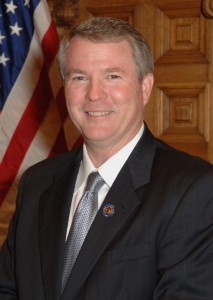 PERRY (January 28, 2011) – I’m honored to continue my service on behalf of my constituents of the 20th Senate District this session. Our state continues to face a number of challenges as it recovers from the worst economic recession in generations, but I look forward to working with my colleagues in the legislature to find solutions to Georgia’s toughest issues.
PERRY (January 28, 2011) – I’m honored to continue my service on behalf of my constituents of the 20th Senate District this session. Our state continues to face a number of challenges as it recovers from the worst economic recession in generations, but I look forward to working with my colleagues in the legislature to find solutions to Georgia’s toughest issues.
One of the most important tools to putting Georgia on a path to economic success is to balance the state budget. This is the legislature’s sole constitutional responsibility and ensures that we do not spend more than we take in, unlike the federal government that has run up trillions of dollars in debt. Georgia faces an almost $2 billion budget hole, which will require us to make difficult cuts to important areas of state government. Governor Nathan Deal has recommended that the state operate on an $18.2 billion budget for the remainder of the 2011 Fiscal Year. This latest budget reduction means the state would be spending $3.6 billion less than in 2009. Our priority is to ensure that government lives within its means, while protecting core state programs and services.
I’m excited to once again serve as chairman of the Senate Natural Resources Committee for the 2011-2012 legislative term. Last year, we passed the most sweeping water conservation bill in Georgia’s history, putting us on a path to maintaining sustainable water resources. The governor recently announced his plan for a water supply program, which will require GEFA to convene a Water Supply Program Task Force that will bring together stakeholders from various state agencies to provide expert guidance in program development. Governor Deal is also recommending that we allocate $300 million spread over the next four years for reservoir creation and expansion.
The Department of Natural Resources board recently made an important vote in the future of interbasin transfers. In keeping with the Statewide Water Plan, the board voted to amend the rule regulating interbasin transfers to protect opportunities for reasonable water use and manage impacts on water resources. Interbasin transfers are currently in place to address water supply and water quality needs in some parts of the state and can be an important tool for meeting future water needs. However, these transfers can have negative impacts on water resources in certain areas, and these regulations ensure that any adverse affects are considered before beginning a transfer. This new rule strikes a good balance between maintaining flexibility while ensuring conservation is taken into account.
To kick off this year’s discussion on Georgia’s natural resources, I asked representatives from our state parks and energy innovation division to deliver an update to members of the committee. Becky Kelley, director of State Parks and Historic Sites, noted that our state parks contribute a $670 million economic impact to the state, and generate over 7,200 jobs. Like all state agencies, the parks division has had to find innovative ways of maintaining operating levels amidst budget cuts. The parks’ sustainability is greatly enhanced through the Friends of Georgia State Parks and Historic Sites, which is comprised of people who volunteer, contribute financially and seek legislative support for the parks. They are truly helping keep the park doors open.
As state funding continues to be tight this year, we must prioritize our spending. Rather than spending money to build new parks, I believe we should put money back into refurbishing our existing parks for at least the next decade. Parks across the state are badly in need of repairs, and we must start that process before we fall too far behind. Georgia’s parks are nationally recognized and play a large role in attracting new and expanding business, and we must dedicate our resources to keeping them up to date.
Georgia is making great strides in alternative energy, according to Jill Stuckey of the Energy Center of Innovation. Georgia has six Centers of Innovation, which provide unique, technology-oriented support to businesses and start-ups in energy, aerospace, agribusiness, life sciences, logistics and manufacturing. Our exceptional forestry industry gives Georgia the greatest advantage in developing biomass energy. We have more forest land any other state other than Oregon. According to Stuckey, our trees grow 38 percent faster than we use them, which give us an exceptional level of inventory. Twelve biomass-to-electricity projects have been announced in Georgia, totaling $1.8 billion in investment and 570 direct jobs.
Diversifying Georgia’s energy portfolio will be crucial to maintaining our competitive advantage in a 21st century economy. Much of our work this session will focus on creating an economic climate that encourages job growth and retention. I look forward to working with our new governor and my colleagues in the legislature to put Georgia on the path to future success.
Sen. Ross Tolleson serves as Chairman of the Natural Resources and the Environment Committee. He represents the 20th Senate District, which includes Bleckley, Dodge, Johnson, Laurens, Pulaski, and Telfair counties and parts of Houston and Wilcox counties. He may be reached at 404.656.0081 or by e-mail at ross.tolleson@senate.ga.gov.
PRESS RELEASE
For Immediate Release:
January 28, 2011
For Information Contact:
Natalie Strong, Director
katie Wright, Communications Manager
Katie.wright@senate.ga.gov
404.656.0028